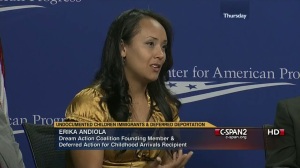 (This article was also published on DailyKOS).
(This article was also published on DailyKOS).
Public policy has personal consequences and it concerns me that an elected official of my country doesn’t seem to realize that. Rather, King sees a dichotomy between doing “individual policy” and doing “national policy for everyone”. That’s nonsensical; any national policy affects individuals—large numbers of individuals. And therein lies one of the problems that plagues us as a nation: politicians make national policy without an awareness of how it affects the individuals who make up “everyone”.
Worse, they assiduously avoid that awareness.
I started to write that have no sympathy for Mr. King. On reflection, I realize that’s not true. I do feel sympathy for someone who does not understand that the words he speaks, the attitudes he promotes, the actions he takes, and the policies he supports affect real people at a very personal level. I feel deep pity for someone who feels that being made aware of the effects of his words and actions on a personal level is an unfair “tactic”.
In the scriptures of my faith is a passage that relates very directly to how our thoughts and words shape discourse. I think it is pertinent here:
“Every word is endowed with a spirit, therefore the speaker or expounder should carefully deliver his words at the appropriate time and place, for the impression which each word maketh is clearly evident and perceptible. … One word may be likened unto fire, another unto light, and the influence which both exert is manifest in the world. …One word is like unto springtime … while another word is even as a deadly poison. It behoveth a prudent man of wisdom to speak with utmost leniency and forbearance so that the sweetness of his words may induce everyone to attain that which befitteth man’s station.” — Tablet of Maqsúd, Bahá’u’lláh
Awareness of the effects of one’s words, attitudes, actions and policies is critical to being, not just a good administrator, but a conscientious citizen of any community, and a better human being—one who makes positive contributions to our shared world.
None of us should dodge the awareness of how our beliefs and the way we express and act on them affects others, but most especially those of us who shape national policy and who claim to be “public servants”. Listening to the current discourse, I am persuaded that many of us are confused about the meaning of servitude and leadership alike.
